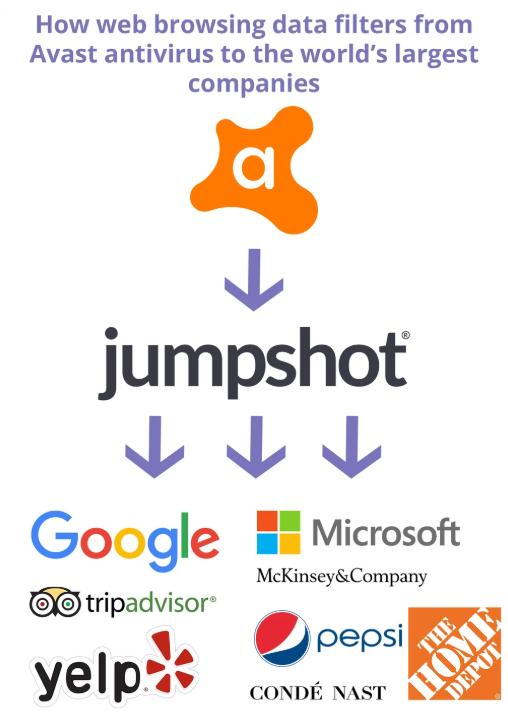Wonder Where Jumpshot is Getting Click Stream Data? … Spoiler Alert: Avast Antivirus
https://www.vice.comDocuments, from a subsidiary of the antivirus giant Avast called Jumpshot, shine new light on the secretive sale and supply chain of peoples’ internet browsing histories. They show that the Avast antivirus program (not a browser plugin BUT the anti-virus program itself) installed on a person’s computer collects data, and that Jumpshot repackages it into various different products that are then sold to many of the largest companies in the world. Some past, present, and potential clients include Google, Yelp, Microsoft, McKinsey, Pepsi, Sephora, Home Depot, Condé Nast, Intuit, and many others. Some clients paid millions of dollars for products that include a so-called “All Clicks Feed,” which can track user behavior, clicks, and movement across websites in highly precise detail.
Services like Ahrefs, which makes use of Click Stream data are probably using this or similar data sources like this. This should not come as a surprise for most veteran marketers. You all might have seen data from Jumpshop before, Rand Fishkin often uses this in his posts. I was not aware of how Jumpshot collected the data now we all know the source .. Avast users.
Avast claims to have more than 435 million active users per month, and Jumpshot says it has data from 100 million devices. Avast collects data from users that opt-in and then provides that to Jumpshot, but multiple Avast users told Motherboard they were not aware Avast sold browsing data, raising questions about how informed that consent is.
The data obtained by Motherboard and PCMag includes Google searches, lookups of locations and GPS coordinates on Google Maps, people visiting companies’ LinkedIn pages, particular YouTube videos, and people visiting porn websites. It is possible to determine from the collected data what date and time the anonymized user visited YouPorn and PornHub, and in some cases what search term they entered into the porn site and which specific video they watched.
Until recently, Avast was collecting the browsing data of its customers who had installed the company’s browser plugin, which is designed to warn users of suspicious websites. Security researcher and AdBlock Plus creator Wladimir Palant published a blog post in October showing that Avast harvest user data with that plugin. Shortly after, browser makers Mozilla, Opera, and Google removed Avast’s and subsidiary AVG’s extensions from their respective browser extension stores. Avast had previously explained this data collection and sharing in a blog and forum post in 2015. Avast has since stopped sending browsing data collected by these extensions to Jumpshot, Avast said in a statement to Motherboard and PCMag.
However, the data collection is ongoing, the source and documents indicate. Instead of harvesting information through software attached to the browser, Avast is doing it through the anti-virus software itself. Last week, months after it was spotted using its browser extensions to send data to Jumpshot, Avast began asking its existing free antivirus consumers to opt-in to data collection, according to an internal document.
“If they opt-in, that device becomes part of the Jumpshot Panel and all browser-based internet activity will be reported to Jumpshot,” an internal product handbook reads. “What URLs did these devices visit, in what order and when?” it adds, summarising what questions the product may be able to answer.
One company that purchased the All Clicks Feed is New York-based marketing firm Omnicom Media Group, according to a copy of its contract with Jumpshot. Omnicom paid Jumpshot $2,075,000 for access to data in 2019, the contract shows. It also included another product called “Insight Feed” for 20 different domains. The fee for data in 2020 and then 2021 is listed as $2,225,000 and $2,275,000 respectively, the document adds. Jumpshot gave Omnicom access to all click feeds from 14 different countries around the world, including the U.S., England, Canada, Australia, and New Zealand. The product also includes the inferred gender of users “based on browsing behavior,” their inferred age, and “the entire URL string” but with personally identifiable information (PII) removed, the contract adds.


